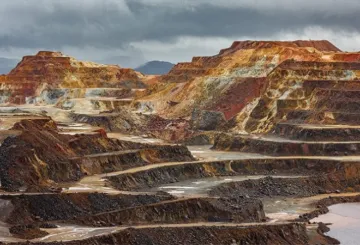Consider these facts: Africa has seven of the fastest growing economies in the world; the continent has the youngest population in the world, which is growing faster than in any other region; and its consumer class is probably one of the fastest growing in the world. Yet, at a time when the US is still coming to grips with the global financial crisis, the first American President of African origin has made only two trips to the continent in five years. His first trip was just for a few hours to Ghana during his first term.
Naturally, there were allegations that President Obama is disinterested in Africa. In fact, Obama’s policy towards Africa has often been compared unfavourably to those of his predecessors, Bill Clinton and George W. Bush, who are popular in the continent because of their initiatives on aid, fighting AIDS and the Millennium Challenge Account. In a bid to counter these allegations and also to revitalise the US interest in the region, Obama undertook a three-nation tour to Africa in the first quarter of July.
During the week-long trip, Obama visited three democracies—Senegal, Tanzania and South Africa. Notable among the list of countries which missed his visit was Kenya, the land of his forefathers. He did not visit Kenya because of charges of crimes against humanity in the International Criminal Court against the Kenyan President. Another exception which raised a few eyebrows is Nigeria, the largest economy in the continent, with whom the US has good relations. Security concerns, perhaps, must have played a role in Obama’s decision not to visit that country.
During the trip, Obama declared a new era in America’s relations with Africa, based on partnership rather than aid. "Ultimately, the goal here is for Africa to build Africa for Africans...And our job is to be a partner in that process," Obama said. The focus of Obama’s trip was on improving trade ties with Africa as was evident from the large number of American businessmen who accompanied the President. US’ trade with Africa was around US$100 billion in 2012. The primary import from Africa to the US is oil. But this is likely to decrease because of increased domestic production, the shale gas revolution and the increased energy efficiency in the US. Therefore, there is a need to broad-base the trade relationship. There is also a need to invest in infrastructure.
Obama announced two major initiatives during the trip. The first was a $7-billion plan called ’Power Africa’ to upgrade power infrastructure so as to double access to electricity in sub-Saharan Africa, where nearly two-thirds of the population has no access to electricity. The second was a trade partnership called ’Trade Africa’ which is initially focused on the eastern African countries of Burundi, Kenya, Rwanda, Tanzania and Uganda. The programme is meant to increase these countries’ trade with each other as well as with the US. The US intends to alleviate some impediments to trade such as physical roadblocks that hold-up the transport of goods and products through this programme. This initiative points to the US’ intention to accelerate regional integration in Africa in order to increase trade and boost growth.
Obama also signed an executive order for combating wildlife trafficking in Africa, especially the sale of rhinoceros horns and elephant tusks. The State Department will allocate US $10 million to train and assist African authorities fighting illegal poaching and sale of animals and animal parts. Another initiative that was unveiled was to train 500 young Africans every year in the US on democratic values and leadership. The President also mentioned that he would renew and improve AGOA (African Growth and Opportunity Act) so as to create more jobs and increase trade.
However, these initiatives, though laudable, are nowhere near the investments made by other powers in the continent. For instance, China, Africa’s largest trading partner, has already invested more than $40 billion in the continent and has promised aid worth $20 billion.
From the strategic angle, what is interesting is Obama’s indirect references to China’s growing role in Africa, warning that feeding natural resources to overseas factories is not a "sustainable model over the long-term". "You produce the raw materials, sold cheap and then all the way up the chain somebody else is making the money and creating the jobs and the value." He also alluded to China’s policy of bringing Chinese to work on Chinese projects. "If somebody says they want to come, build something here, are they hiring African workers? If somebody says that they want to help you develop your natural resources, how much of the money is staying in Africa? "Make sure that whoever you’re dealing with ... you’re getting a good deal that’s benefiting the people here and that can help to spur on broad-based development."
Obama’s allusions to China, though much milder than Hillary Clinton’s statements during her visits, display the weakness and increasing insecurity among US policymakers about losing ground to China in Africa. China has stolen a march over other external actors due to its focus on trade and lack of concerns vis-à-vis human rights, labour standards and environmental protections -- causes dear to the West.
Second, Obama’s statement is almost a throwback to typical colonial patronising—advising the Africans against China, as if Africans cannot decide for themselves what is good for them. As the sole superpower, the US does not need to make such statements as they only show that it is on the defensive vis-à-vis China.
Surprisingly, there was little focus on countering terror, which has been a priority for the US in Africa, given the upsurge in terrorist activities in the last few years. The only significant remarks Obama made on the issue were during a question and answer session where he said that terrorism affects everybody, not just the US. He also attributed the growth of terrorism to mis-governance saying that, "it is my strong belief that terrorism is more likely to emerge and take root where countries are not delivering for their people and where there are sources of conflict and unaligned frustrations that have not been adequately dealt with". He suggested that there is no military solution to the problem. He, however, said the US is willing to help build the capacity of African countries to fight terrorism by providing advice, training and equipment.
Obama’s trip does show that US indifference to the continent is dissipating, possibly because of the big stakes — economic and strategic — that have come to the fore with the involvement of other powers. It is undoubtedly an important step towards treating the continent as an equal trade partner, not just a charity case where the US can dispense aid and hold forth on human rights, labour conditions and environmental protection ad nauseam. But the US needs to seriously reconsider its policy of advising African countries about how they go about their foreign policy or risk losing any goodwill it has left in the region. Also, perhaps Obama’s visit has come too late in the day and his promises are too little to entice the Africans.
The views expressed above belong to the author(s). ORF research and analyses now available on Telegram! Click here to access our curated content — blogs, longforms and interviews.




 PREV
PREV

